Armed Forces of Vinalia
This article is incomplete because it is pending further input from participants, or it is a work-in-progress by one author. Please comment on this article's talk page to share your input, comments and questions. Note: To contribute to this article, you may need to seek help from the author(s) of this page. |
| Armed Forces of Vinalia | |
|---|---|
| Сили народної оборони Віналії | |
| Founded | 1993 |
| Service branches | Army Navy Air Force People's Guard |
| Headquarters | Vinalinsk |
| Leadership | |
| Chief of the Vinalian Armed Forces | Minister-President Omelyan Pavlov |
| Minister of Defence | Svyatoslav Orestovych |
| Chief of Staff | Josyp Stepanovych |
| Personnel | |
| Military age | 18 |
| Conscription | None allowed although provisions exist |
| Active personnel | 145,000 |
| Reserve personnel | 100,000 |
| Expenditure | |
| Budget | $4.83 billion |
| Percent of GDP | 1.8% (2020) |
| Industry | |
| Domestic suppliers | Red Coast Tuvular United Boslan Kru Armory |
| Annual exports | TYI-80 |
The Armed Forces of Vinalia (Soravian:Збройні сили Віналії) is the unified military service of Vinalia, and their civil service and procurement authorities. It is composed of the Army, Navy, Air force, and People's Guard. The armed forces are under the orders of the Minister-President, although the People's Guard are provincial level units nominally under control of their respective governor.
The Armed Forces is tasked with defending Vinalian sovereignty, and it's interest. It has been deployed to a variety of international peacekeeping missions, and maintains an active commitment to global peace in the Community of Nations, with over X men deployed worldwide. The Armed Forces of Vinalia takes it's roots from the People's Liberation Army of the former People's Republic of Vinalia, or North Vinalia, and the Armed Forces of the former Republic of Vinalia, or South Vinalia.
The Armed Forces has a total strength of 145,000 military personnel, 110,000 active and 100,000 men in the reserves. The AFV receives a budget of $4.83 Billion accounting for 1.8% of the total GDP of Vinalia, by law the expenditure in peacetime must not go over 2% of the total GDP, unless by vote in both the national parliament and constituent state parliaments. It has never gone above 2%
History
The AFV was formed on the eve of Vinalian Reunification in accordance to the Treaty of Bin, which reunified both states and their respective armed forces. At the time of reunification the AFV held over 500,000 men in it's ranks, 250,000 men from North and South, making it one of the largest armies at the time. Although the 10 Day War had ended 5 years earlier in 1987, by 1993 both sides still held considerable military stockpiles, with the North holding close to 4,000 Tanks, and over 15,000 Mechanized vehicles most of them severely outdated and in need of maintenance. The AFV began the process of demilitarization in both sides selling thousands of vehicles to foreign buyers and scrapping the rest, along with reducing it's total number of 500,000 total men with close to a Million men more in reserves to just 110,000 total men active and reserves included, which was later expanded to 145,000 in 1995 where it has remained until today. This process was finished by 1998, when the AFV reached it's desired strength of 145,000 men.
By the start of the new millennium the AFV reunification process was concluded with the AFV establishing itself as a highly trained and well equipped force, do it's large quantities of military equipment. The AFV would see itself involved in a variety of CN Peacekeeping missions sending 100 soldiers to X, in XXXX and 300 personnel to X, in XXXX starting Vinalian participation in CN missions where today is one of the biggest supporters of international peacekeeping missions.
Organization
The Armed Forces report directly to the Minister-President, and are under the supervision of the Minister of Defence, and their General Staff consisting of 2 of the highest members of each branch of the armed forces, along with appointees from the president, Minister-President, and each of the two constituent states, with each sending 1.
- General Staff of the Vinalian Armed Forces
- Joint Forces Command of the Vinalian Armed Forces
- services of the VAF
- separate branches of the VAF
- People's Guard Command
- Logistical Forces Command
- Support Forces Command
- Medical Forces Command
- Signals and Cyber-Security Troops Command
Branches of the Armed Forces
Army of Vinalia

The Vinalian Army is the largest of the active military units with 80,000 men, divided into 7 brigades (5 Mechanized, and 2 Armored), 2 Artillery brigades, and support elements. The army is recognized as one of the most mobile, and experienced armies in the world do to the former Northern Vinalian doctrine of specialized breakthrough armored units, which were feared for their ability, and mobility. The Army is divided into 4 sectors: Northern, Central, Eastern, and Southern sectors. Elements of the 5th Mechanized Brigade are usually deployed abroad for peacekeeping operations, and the brigade is the best equipped out of all the army.
The equipment of the army is a mixture of inherited Northern and Southern equipment, with post reunification foreign acquisitions. The primary rifle of the armed forces is the KRU-41, with the natively produced KRU-1000 as a sidearm. Its Main battle tank is the TYI-80 which is a natively upgraded and produced version of the Chistovodian tank. It utilizes the Infantry Fighting Vehicles TYI-1000 and the AJK-25, and the Verkan Armored Personnel Carrier.
The Vinalian Navy is organized in 4 naval zones headquartered in Orlavo, Chervona, New Samistopol, and Catherinsk. It has a strength of around 9,000 troops, making it the smallest of all branches. It has been historically sidelined for the ground forces and air force, until the recent acquisition of frigates from Rizealand.
The flagship of the fleet is the Red Sun Vurna Class Missile Boat. It operates 6 frigates, 14 patrol boats, and 4 Diesel Attack submarines. As well as tankers and cargo ships. The Vinalian Navy also has a naval aviation force, a naval infantry battalion and special forces units.
Vessels
| Class | Image | Type | Origin | Number | Notes |
|---|---|---|---|---|---|
| Missile Boats | |||||
| Vurna Class |  |
MSB | North Vinalia | 3 | Inherited from Northern Navy. |
| Class | Image | Type | Origin | Number | Notes |
|---|---|---|---|---|---|
| Frigates | |||||
| Gearing Class | 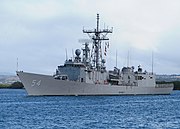 |
FF | Halland | 7 | Bought from Halland in 2010. |
| Class | Image | Type | Origin | Number | Notes |
|---|---|---|---|---|---|
| Patrol Craft | |||||
| Vevetsia Class |  |
PB | Vinalia | 8 | 2 more being constructed, to be delivered in 2021. |
| Class | Image | Type | Origin | Number | Notes |
|---|---|---|---|---|---|
| Attack Submarine | |||||
| !Foxtrot-Class | 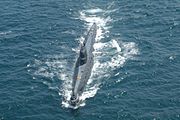 |
SSK | Chistovodia | 4 | Inherited from the Northern navy, acquired from Chistovodia in 1970. |
| Class | Image | Type | Origin | Number | Notes |
|---|---|---|---|---|---|
| Auxiliary Vessels | |||||
| Vinia Class |  |
T-Ake | South Vinalia | 1 | All inherited from the south |
Vinalian Air Force
The Vinalian Air Force (VAF) is the air component of the Armed Forces. The VAF operates aircraft inherited from both north and south Vinalian. The VAF was at its start among the largest air forces in the world, as a result of large stockpiles of outdated aircraft kept in service by both countries. Most equipment was scrapped or sold off, while a professional core of equipment was retained.
The VAF is divided into six wing areas, headquartered in Orlavo, Jangorod, Vinalinsk, and Velkarichka. With a strength of 11,000 troops, the VAF counts in its arsenal with G-7 and FCO-88 as multirole aircraft. The FCO-85 as strike aircraft. TYI-45 Attack helicopters, and TYI-40 Transport Helicopters. The locally produced TPK-151 training aircraft. RCA-25 transport aircraft, and RCA-135 tanker aircraft
Aircraft
| Class | Image | Type | Origin | Number | Notes |
|---|---|---|---|---|---|
| Fighter Aircraft | |||||
| G-7 |  |
Fighter | Soravia | 12 | Gulka G-7 bought from Soravia in 2021. |
| FCO-88 | 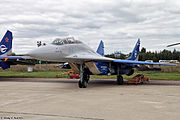 |
Fighter | Chistovodia | 16 | 4 inherited from Northern airforce, out of an order of 20 aircraft, was reduced to 12 aircraft with the last delivery in 1998. |
| VAF-2000 | 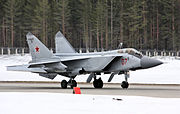 |
Fighter | Chistovodia | 12 | Originally bought 30 from Chistovodia in 1987, for delivery in 1989, but the breakout of the 12 Day War in 1987, and improving relations between both Vinalia's delayed the contract. The contract was renewed, and 12 were delivered by 2000. |
| Class | Image | Type | Origin | Number | Notes |
|---|---|---|---|---|---|
| Strike Aircraft | |||||
| B7D Lancer | 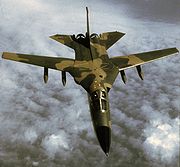 |
Attack Aircraft | Halland | 4 | Inherited from the Southern Air force, acquired in 1977 from Halland. |
| FCO-85 | 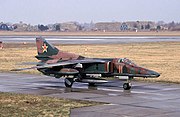 |
Attack Aircraft | Chistovodia | 10 | Inherited from the Northern Airforce, acquired from Chistovodia in 1985. |
| Class | Image | Type | Origin | Number | Notes |
|---|---|---|---|---|---|
| AWACS | |||||
| VAF-10 |  |
AWACS | Halland/Vinalia | 2 | Acquired from Halland in 2010. |
| Class | Image | Type | Origin | Number | Notes |
|---|---|---|---|---|---|
| Utility Aircraft | |||||
| RCA-25 | 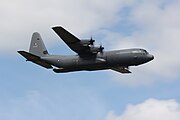 |
Transport | Halland/Vinalia | 4 | Acquired from Halland in 1980 by the Southern Airforce, upgraded in 2004 by Red Coast Aircraft. |
| RCA-135 | 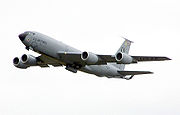 |
Tanker | Halland/Vinalia | 1 | Acquired from Halland in 1975 by the Southern Airforce, and upgraded in 1985, and 1999. |
| VAF-199 | 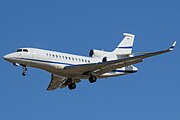 |
VIP Transport | Gaullica | 2 | Bought in 2009 for $80 million. Plane utilized by members of the government, including the President, and Minister-President |
| Class | Image | Type | Origin | Number | Notes |
|---|---|---|---|---|---|
| Trainer Aircraft | |||||
| TPK-151 | 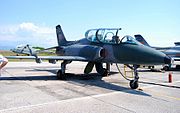 |
Trainer | North Vinalia/Vinalia | 10 | Inherited from the Northern Airforce, light bombers converted into trainers. |
Retired aircraft
| Class | Image | Type | Origin | Number operated | Year retired | Notes |
|---|---|---|---|---|---|---|
| ZFB-17 | 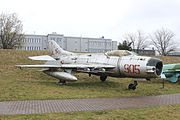 |
Fighter-bomber aircraft | Chistovodia | 9 | 1993 | Inherited from the Northern Airforce, acquired from Chistovodia in 1973. Retired in 1993 remaining scrapped with 1 kept in a museum. |
| FOC-61C | 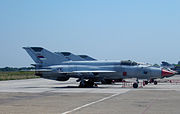 |
Fighter Aircraft | Chistovodia | 17 | 1999 | Inherited from the Northern Airforce, acquired from Chistovodia in 1961. 10 were sold off in 1993 to Ajahadya. Retired in 1999 remaining scrapped with 3 kept in museums. |
| RCA-82 |  |
Fighter Aircraft | Chistovodia | 13 | 2014 | Inherited from the Northern Airforce, acquired from Chistovodia in 1982. 10 were sold off in the 1995 to Lavana. Retired in 2014 remaining scrapped with 1 kept in a museum. |
| RCA-80 |  |
Fighter aircraft | Chistovodia | 26 | 2016 | Inherited from the Northern Air Force, acquired from Chistovodia in 1980. 15 were sold off in 1995 to Lavana. Retired in 2016 remaining scrapped with 2 kept in museums. |
| F10G |  |
Fighter aircraft | Halland | 8 | 2020 | Acquired by the Southern Air force in 1978 from Halland. In reserve. |
Prospective
Vinalia expressed interest in 2009, in acquiring Marchenian aircraft mainly the !F-16 to replace it's aging fleet of VAF-01 multirole aircraft. Vinalian negotiations over acquiring a modernized version of the aircraft increased following the buying of the Gearing class frigates and some aircraft from Halland, in 2014 2 aircraft arrived in Vinalia for training and demonstration. The cost of acquisition was a problem for Vinalian authorities which desired to acquire 30 aircraft to replace it's aging fleet, but would run into monetary constraints. In 2016 negotiations were pulled off by Nuxica citing diverging interests.
In November 2020 Vinalia and Soravia re opened negotiations which had been frozen for several years on the acquisition of the Soravian made G-7, negotitions were short as in March the Minister-President Omelyan Pavlov, announced the acquisition of 12 fighters and several highly advanced missiles from Soravia the KR-31 with the possible anti-naval variant of the missile acquired.
People's Guard
The People's Guard was established in 1995, to serve the role of Gendermarie, under the control of provincial governors. They provide police assistance and security at the governors orders, they're armed and paid by the federal government but only under decree of Parliament can they be federalized. By federal law each province and federal district is to maintain a force of minimum 100 men, and a maximum of 5,000. Currently there are 35,000 People's Guard.
The people's guard utilize the same equipment as the regular army.



